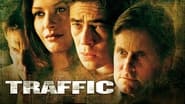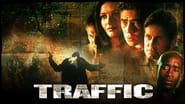mr_diken
One could mention many positive points about this movie but for me the most important attribute is its wider approach to the phenomenon. It tells the stories of almost all sides of the "business" so that one can get the vantage points of all sides. Moreover, it stands equidistant to those. I don't know any other example of this.
wmberezowki
Traffic was an okay film, and that's pretty well my complete opinion on it. I appreciated the message and thought it was interesting, but I had trouble staying completely engaged throughout. This movie isn't too old and although I wasn't too enthralled by it, I do think it aged well. The cinematography may not be the most spectacular but it does has nice aspects that aren't dated yet (the tone, the shots). For me, the different tones from each location were the most interesting part to watch, seeing where they put each colour in and when and also why. I was wondering why they put the blue on only sometimes in Washington; I think I would've figured it out if I had watched closer. I think the colour tones helped move the storyline along really nicely as it created a different mood and feeling each time it switched. Much enjoyed. In the end when Michael Douglas resigned, I think it was because he finally realized he was fighting a losing battle. The drug war was hopeless and he knew it because there are always going to be more people filling in for those who get arrested. Also, he knew he couldn't be fighting his daughter because she would just spiral further; it wouldn't work. A final reason would be that he knew he was doing the right thing by stepping down; he needed to lead the next movement of helping and supporting those who struggle with substance abuse instead of fighting them and pushing them away. All in all, a decent film.
Screen_Blitz
Drugs are bad, not doubt about it. But the worst and most incomprehensible aspect about drug usage is the complex politics that go behind the dirty business. From the government of the higher hierarchy to the law enforcement roaming around on the streets, the American war on drugs is a complicated business from inside and out. Morals are tested and families are threatened, and the consequences behind the illegal drug business are, more or less, as tragic as what director Steven Soderbergh displays on screen. Capturing its political concept in multiple story lines, Soderbergh straps audiences into a gripping portrayal of a society brought its knees by the illegal drug trade and the violent repercussions of the contraband activity, all while gripping us with an emotional resonance surrounding the gritty nature of a world run amok by moral ambiguity. The film, revolving around the American war on drugs, is told of three intertwining perspectives. The first one follows two Mexican police officers Javier Rodriguez (played by Benicio Del Toro) and Manolo Sanchez (played by Jacob Vargas) who are tasked by their boss Arturo Salazar (played by Tomas Milian) to take down the Juarez drug cartel, on to themselves wrapped up in a double-crossing scheme. A second following one following two DEA agents Montel Gordon (played by Don Cheadle) and Ray Castro (played by Luis Guzman) who capture a local drug dealer who in return, rats out his boss Carlos Ayala (played by Steven Bauer), who is arrested and must face trial under the defense of his attorney (played by Dennis Quaid) while his wife (played by Catherine Zeta-Jones) and child are threatened by his accomplices. Then a third one following a Ohio conservative judge Robert Wakefield (played by Michael Douglas) who learns his teenage daughter has become hooked on heroin.For such a heavy and bold topic such as the illegal drug exchange, it is only expected that Steven Soderbergh captures both the emotional and politically-charged atmosphere of its plot. In the midst of his ambitious approach, his efforts are mostly successful as he brings the script, written by Stephen Gaghan, to gritty effect. Soderbergh doesn't journey through the safe route of going for a straight forward approach to the story, especially for one told through three intertwining story lines, each of which are shot in alternating color shades to allow us to tell each storyline apart (as if the cast of characters for each storyline were not enough to make things clear). There are just a few problematic elements that lie within his daunting approach. For one, it is a little overlong, mostly with how the story meanders during the final half hour as each of the characters come to terms with their tragedies. On the other hand, that does almost nothing to take away from the emotional magnitude that the film pounds us on once the story kicks into gear. In addition, there is plenty to say about the nature of America during the war on drugs, and not in a way that shouts with condemnation against the war nor clear justification for it. That is mostly kept ambiguous. And the same goes for the characters of whom are portrayed with a morally gray persona wrestling in battles between right and wrong, the best of which is demonstrated in the storyline following Javier and Manolo who face the moral corruption of their superior officer who has something fishy going on behind their backs. If there is one thing that is made clear, it is that law enforcement officers are not always the good guys. Some of them may be worse than the drug dealers. With such an enormous ensemble cast sharing the spotlight, it is difficult to single out one above the rest in terms of the most grounded of performances. However, this crown would have to go to Benicio Del Toro as Javier Rodriguez, a man wrestling with his conscious when he along his partner witness the ugly image his boss reveals behind the mask. Although he doesn't fall into the hero category, he is one of the very few individuals we can sympathize with as he is dragged into a dark and complicated underworld of moral ambiguity. Michael Douglas, playing a conservative judge who faces every parent's worst nightmare: her child hooked on drugs, is powerful in his role as well. The same can said for Don Cheadle and Luis Guzman in their roles as DEA agent fighting against the bloody drug trafficking operations. Although both of their character arcs are shallow of depth, these actors show they have the acting chops to take on such daunting roles. Catherine Zeta-Jones is well with her performance. But again, nothing that avoids getting blown out of the water by the performance of Del Toro. After all, he is the shining star among the cast, despite the fact being in a supporting role like everyone else. All in all, it seems like everyone in the cast had their game faces on throughout filming. Traffic is a gripping, if overlong examination on the American drug wars shining the ambitious directorial methodology of Steven Soderbergh. For such a violent and gritty take on its subject matter, it is powerful, it is realistic, and almost never fails to capture the political magnitude of its concept.
adonis98-743-186503
A conservative judge is appointed by the President to spearhead America's escalating war against drugs, only to discover that his teenage daughter is a crack addict. Two DEA agents protect an informant. A jailed drug baron's wife attempts to carry on the family business. My biggest problem with this film was that it felt a bit slow at times and that kinda bugged me a lot but other than that the acting was great and the story was interesting but they could have easily done a much better job with both their characters and their actors but overall it's good for an one time watch and i'm going to give it an 6.5/10

















